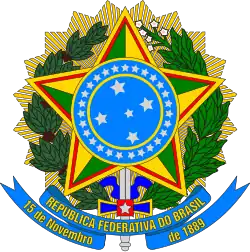Bolsominion

Bolsominion (from the English minion)[1] is a pejorative term used in Brazil to refer to certain supporters of former Brazilian president Jair Bolsonaro.[2] The expression combines the first part of the surname Bolsonaro with the word minion, meaning "servant" or "follower", and also recalling the popular animated characters from the Despicable Me franchise.[3] The term began circulating widely in Brazilian media during Bolsonaro’s 2018 presidential campaign.[4][5]
Characteristics and ideology
| This article is part of a series on |
| Conservatism in Brazil |
|---|
 |
The characterisation of "bolsominions" generally appears in critical or satirical contexts. Commentators and analysts often describe the term as referring to individuals perceived as strongly supportive of Bolsonaro’s political style and policies, frequently aligned with conservative or populist positions.[6] Some descriptions associate them with far-right views, including support for a greater role of the Brazilian Armed Forces in public life, scepticism towards progressive social agendas, and emphasis on conservative values in areas such as education, morality and public security.[7]
In online discourse, Bolsonaro’s supporters and detractors have exchanged pejorative labels. For example, some supporters use the expression "esquerdopata" ("pathological leftist") to criticise opponents, while critics employ the term "direitopata" ("pathological rightist") in response.[8]
Some analyses also note that a portion of Bolsonaro’s base expressed sympathy with Donald Trump’s presidency and political style in the United States.[9]
Usage and cultural impact
The expression has been used in both political commentary and popular culture. In 2019, federal deputy Eduardo Bolsonaro celebrated his birthday with a party themed around the Despicable Me Minions, which was widely interpreted by the media as a reference to the "Bolsominion" label.[10]
See also
References
- ^ "Significado de Minion (O que é, Conceito e Definição)". Significados (in Brazilian Portuguese). Retrieved 20 August 2020.
- ^ Layton, Matthew; Smith, Amy Erica. "Analysis | In Brazil, Jair Bolsonaro's victory may mean further shifts in tolerance and moderation". Washington Post. ISSN 0190-8286. Retrieved 1 December 2020.
- ^ "A formação e a grafia do nome bolsomínion - Ciberdúvidas da Língua Portuguesa". ciberduvidas.iscte-iul.pt. Retrieved 9 September 2020.
- ^ "Jair Bolsonaro: Why Brazilian women are saying #NotHim". BBC News. 21 September 2018. Retrieved 1 December 2020.
- ^ Phillips, Tom (3 July 2019). "'A bad trip': Jair Bolsonaro's first six months leave even the right dismayed". The Guardian. ISSN 0261-3077. Retrieved 1 December 2020.
- ^ "Bolsominions: quem são e do que se alimentam". Extra Online (in Brazilian Portuguese). 27 April 2016. Retrieved 9 September 2020.
- ^ Fernandes, Peterson (27 May 2019). "Na caverna do mito". Medium. Retrieved 9 September 2020.
- ^ "Bolsominions: quem são? Onde vivem? Do que se alimentam? Como se reproduzem?". Socialista Morena (in Brazilian Portuguese). 21 November 2017. Retrieved 9 September 2020.
- ^ "Churrascaria nos EUA simboliza divisão de brasileiros sobre Bolsonaro". BBC News Brasil (in Brazilian Portuguese). Retrieved 9 January 2021.
- ^ "Eduardo Bolsonaro ganha festa com o tema 'Minions' em referência a 'Bolsominion'". Amazonas1 (in Brazilian Portuguese). 11 July 2019. Retrieved 21 November 2020.
Bibliography
- Indursky, Alexei Conte (21 May 2020). "Psicanálise, fascismo e populismo: notas sobre a emergência do bolsonarismo no Brasil". Teoría y Crítica de la Psicología. 14 (2020): 150–162. ISSN 2116-3480.
- Moraes, Alex Martins (2019). "NOSSA DIREITIZAÇÃO EM TRÊS TEMPOS: ORIGENS, AGORA E MAIS ALÉM". SOMANLU: Revista de Estudos Amazônicos. 19 (1): 6–17. doi:10.29327/233099.19.2-1.
- Oliveira, Natasha Ribeiro de (2020). A febre amarela "minions": uma análise bakhtiniana (Thesis). Araraquara.
- Pinheiro-Machado, Rosana; Scalco, Lucia Mury (March 2020). "From hope to hate: The rise of conservative subjectivity in Brazil". HAU: Journal of Ethnographic Theory. 10 (1): 21–31. doi:10.1086/708627. S2CID 212916540.
- De Paula, Luciane; De Oliveira, Natasha Ribeiro (24 March 2020). "Minions nas telas e bolsominions na vida: uma análise bakhtiniana". Letrônica. 13 (2): e36198. doi:10.15448/1984-4301.2020.2.36198.
- Paula, Luciane de; Oliveira, Natasha Ribeiro de (13 November 2020). "Viralização amarela: os minions na vida, nas mídias e na arte". Revista Diálogos (in Portuguese). 8 (3): 74–95. ISSN 2319-0825.
- Recuero, Raquel da Cunha (10 December 2019). "Disputas discursivas, legitimação e desinformação: o caso Veja x Bolsonaro nas eleições brasileiras de 2018". Comunicação Mídia e Consumo. 16 (47): 432–458. doi:10.18568/cmc.v16i47.2013. ISSN 1983-7070.
- Reis, Mauricio Martins; João, Catharine Black Lipp (18 October 2019). "A polarização política brasileira e os efeitos (anti) democráticos da democracia deliberativa". Teorias do Direito e Realismo Jurídico (in Portuguese). 5 (1): 1–22. doi:10.26668/IndexLawJournals/2525-9601/2019.v5i1.5426. ISSN 2525-9601.
- Silveira, Letícia Pena (2018). "Memes: a ostentação de neologismos e uma ferramenta de ensino". Revista GTLex. 4 (1): 79–97. doi:10.14393/Lex7-v4n1a2018-5. ISSN 2447-9551.
Dessa forma, um bolsominion seria aquela pessoa que é servo, criado de Bolsonaro, aquele que o apoia e a todas as suas ações. Nesse caso, considera-se cruzamento lexical por hibridismo pelo fato de haver a junção de uma palavra do vernáculo e outra do inglês.